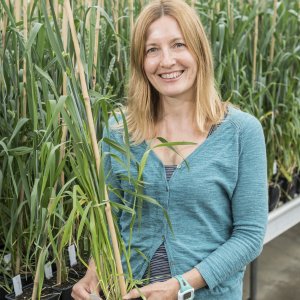
Tracie joined the Moore Lab in 1990, initially working on cereal genome synteny; identifying conserved blocks of genes between a number of different cereals such as wheat, rice and maize. The group used cereal synteny to map Ph1, a major locus in wheat involved in maintaining genome stability.
They showed that okadaic acid could be used to temporarily suppress Ph1, to allow wheat chromosomes to pair with chromosomes from its wild relatives. This gave access to a large pool of previously unavailable genes, making it possible to create stable wheat hybrids with new, agronomically beneficial traits.
Tracie’s more recent research has focused on the effects of high temperature on wheat floral development and grain set.
Climate change over the next 50 years could have a significant impact on grain yield and therefore food security, so this area is of substantial interest to plant breeders. Using a combination of molecular and cytological approaches, Tracie showed that exposure of wheat to high temperatures during floral development can have a detrimental effect on wheat chromosomes during the meiotic cell cycle and can dramatically reduce grain number.
She identified a developmental stage during early meiosis that is particularly temperature-sensitive and found a link between heat tolerance and the presence of wheat chromosome 5D.
The group is also involved in understanding the effects of low temperature on wheat meiosis. Under low temperature conditions, if chromosome 5D is absent, chromosomes can no longer pair correctly during meiosis.
Tracie is using KASP genotyping and deletion mutant analysis to identify candidate genes for this phenotype and is exposing the resulting deletion lines to low temperatures to identify those with chromosome pairing abnormalities.
Selected Publications
-
Draeger T., Martin A. C., Alabdullah A. K., Pendle A., Rey M. D., Shaw P., Moore G. (2019)Dmc1 is a candidate for temperature tolerance during wheat meiosisTheoretical and Applied GeneticsPublisher's version: 1432-2242
-
Draeger T., Moore G. (2017)Short periods of high temperature during meiosis prevent normal meiotic progression and reduce grain number in hexaploid wheat (Triticum aestivum L.)Theoretical and Applied Genetics (130)Publisher's version: 0040-5752
